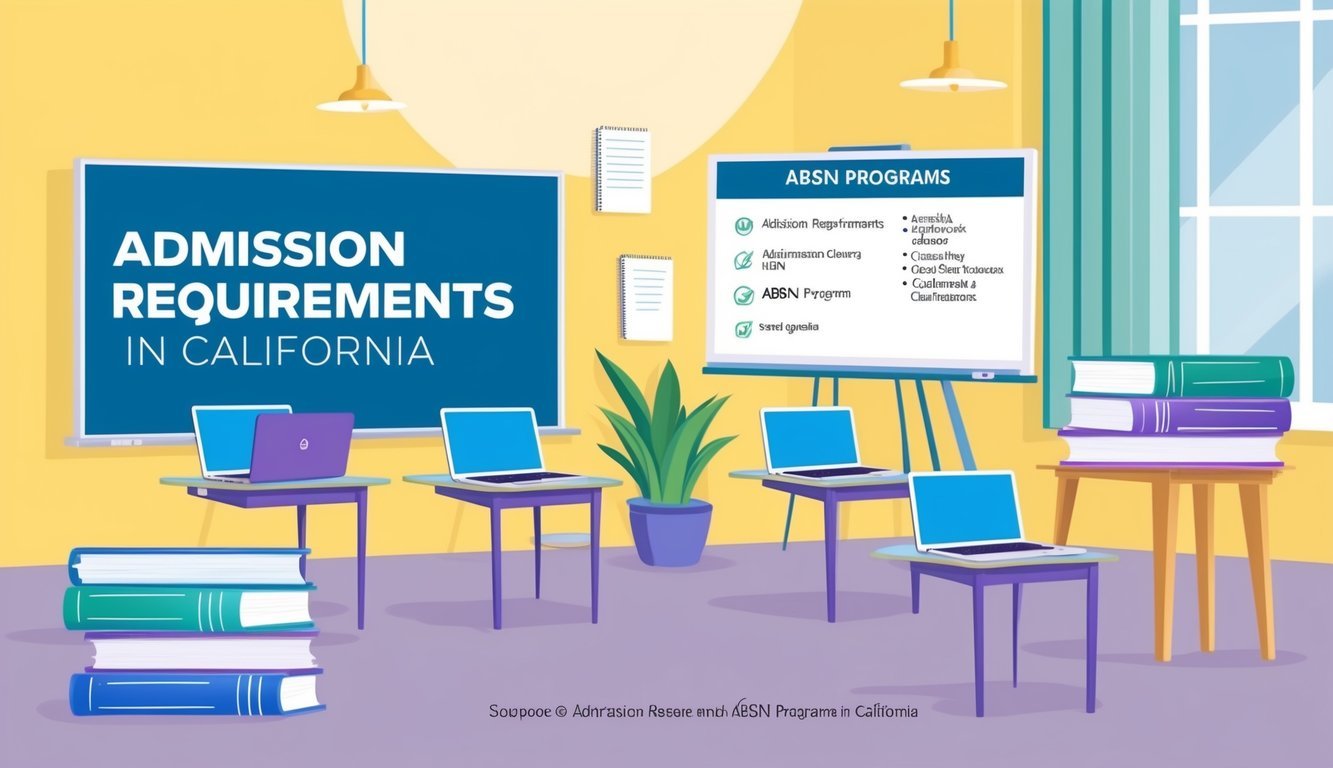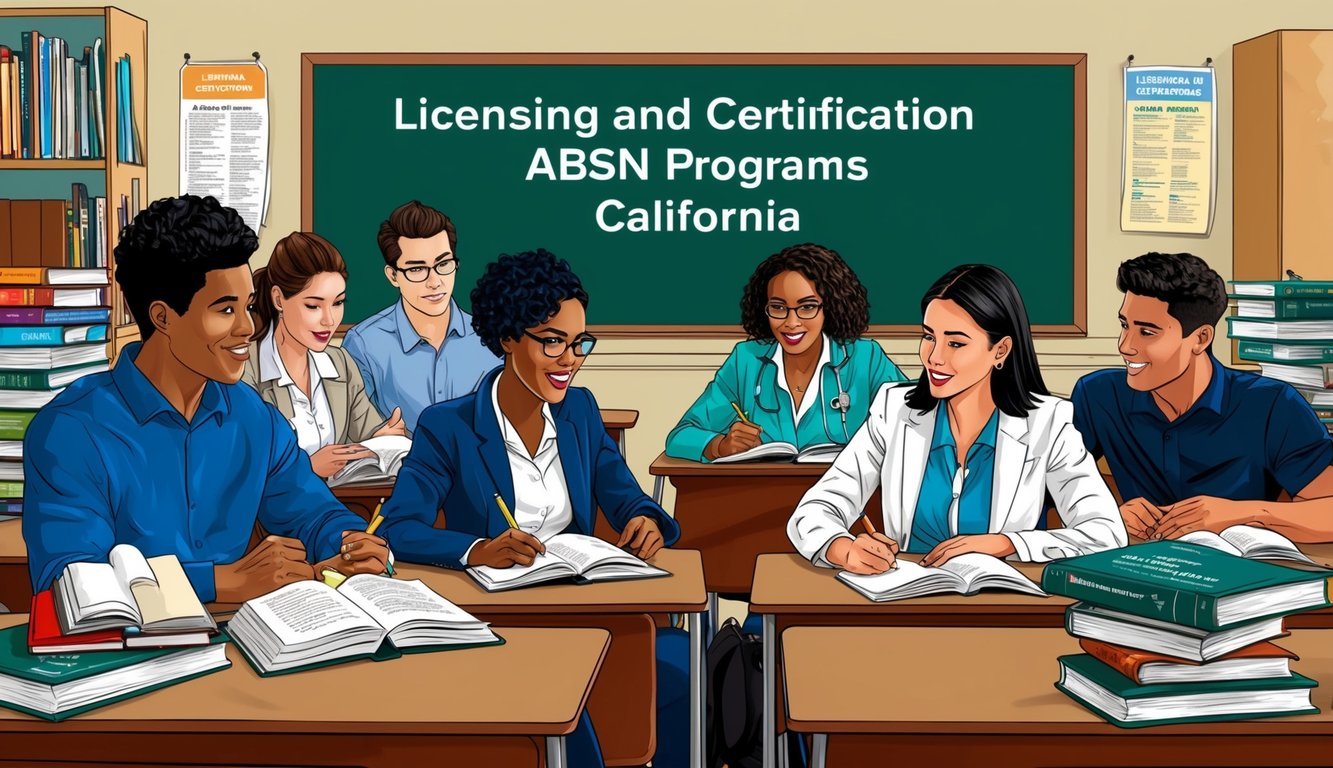If you’re considering a career in nursing and already hold a bachelor’s degree in another field, Accelerated Bachelor of Science in Nursing (ABSN) programs in California offer a fast track into the profession.
These programs typically condense traditional nursing coursework and clinical experiences into a shorter time frame.
Many programs complete in as little as 15 months.
With numerous options available throughout the state, you can find a program that fits your needs and timeframe.
California is home to several reputable ABSN programs, including offerings at institutions like California State University-Los Angeles and Concordia University Irvine.
Each program has unique features, such as location, curriculum structure, and clinical opportunities, allowing you to choose one that aligns with your goals.
As you navigate your options, consider factors like program length, cost per credit, and the availability of hands-on clinical experiences.
Exploring these programs not only prepares you for the challenges of nursing but also connects you with quality healthcare systems in California.
With the right training, you can launch a fulfilling career that makes a meaningful impact on people’s lives.
For detailed insights on specific programs, you may refer to resources like Nurse.org or absn.org.
Understanding ABSN Programs in California
Accelerated Bachelor of Science in Nursing (ABSN) programs in California offer a fast track for individuals looking to transition into nursing.
These programs cater to those with a prior degree, combining rigorous coursework and clinical training, allowing you to earn your BSN in a shorter timeframe.
The Rise of Accelerated BSN Programs
The demand for healthcare professionals in California is increasing due to a growing population and diverse health needs.
Accelerated BSN programs have emerged as a solution for addressing this shortage by providing a quicker pathway for graduates to enter the nursing workforce.
Many California universities now offer ABSN programs, with course durations typically around 15 months.
Notable institutions include California State University, Los Angeles, and the College of San Mateo.
Comparing Traditional BSN and Accelerated BSN Paths
Traditional BSN programs usually take four years to complete, with a comprehensive undergraduate education.
In contrast, ABSN programs condense this timeline significantly.
| Feature | Traditional BSN | Accelerated BSN |
|---|---|---|
| Duration | 4 years | 15 months |
| Prerequisites | High school diploma | Previous bachelor’s degree |
| Clinical Experience | Integrated throughout | Intensive focus in final months |
| Enrollment | Limited yearly admission | More frequent start dates |
Choosing between these paths depends on your previous education and career goals.
If you already have a degree, the ABSN offers an efficient option to transition into nursing while providing the necessary knowledge and skills for success.
Admission Requirements for ABSN Programs

When applying to ABSN programs in California, you must meet specific admission requirements.
These requirements can vary by institution, but typically include academic prerequisites, submission of a personal statement, and completion of background checks and interviews.
Prerequisites and Minimum GPA
To be considered for an ABSN program, you generally need to hold a non-nursing bachelor’s degree.
Most schools require you to have completed specific prerequisite courses, which often include subjects like human anatomy, physiology, microbiology, and statistics.
A minimum GPA of 3.0 is commonly required, but some programs may be more competitive, necessitating higher GPAs.
Ensure that your academic transcripts reflect your coursework and grades clearly.
Check specific program websites for detailed lists of prerequisites and GPA requirements such as those from Nurse.org.
Submitting A Personal Statement
A well-crafted personal statement is crucial for your application.
This document allows you to express your motivations for pursuing a career in nursing and highlights your unique experiences or skills.
When writing your personal statement, consider the following points:
- Discuss your background, including any relevant volunteer or work experiences.
- Explain why you are interested in the ABSN program specifically.
- Convey your understanding of the nursing profession and your career goals.
Be sure to follow any specific guidelines provided by the program regarding length and content.
This is your opportunity to make a lasting impression.
Background Checks and Interviews
Most ABSN programs require applicants to undergo background checks as part of the admission process.
This is to ensure that candidates have no disqualifying criminal history, as nursing involves a high degree of trust and responsibility.
Check the specific requirements for background checks on program websites.
Additionally, you may be required to participate in an interview.
This interview assesses your interpersonal skills and commitment to the nursing field.
Prepare for your interview by researching typical questions and practicing your responses.
An effective interview can significantly enhance your chances of being accepted into the program.
Curriculum and Clinical Training

The curriculum of Accelerated BSN programs in California is designed to equip you with essential nursing knowledge and skills.
You will engage in core nursing courses while also gaining hands-on clinical experience through placements in various healthcare settings.
Core Nursing Courses and Specializations
In your ABSN program, you will cover a range of core nursing courses, which might include:
- Nursing Fundamentals: This course lays the groundwork for essential nursing skills such as patient assessment and care.
- Pharmacology: Understanding medications and their effects on patient care is critical for safe practice.
- Public Health: This course focuses on community health, disease prevention, and health promotion strategies.
- Gerontology: You will learn about the unique health needs of aging populations.
You might also have opportunities to specialize in areas like pediatrics, mental health, or critical care, depending on your program.
Clinical Placements and Experience
Clinical training is a vital component of your ABSN journey.
You will participate in a series of clinical placements that provide you with real-world experience in various healthcare environments.
These placements often occur in:
- Hospitals
- Community clinics
- Long-term care facilities
During these experiences, you will develop practical skills under the supervision of licensed nurses.
This hands-on training allows you to apply theoretical knowledge, enhancing your readiness for the nursing workforce.
The integration of coursework and clinical practice ensures you are well-prepared for the challenges of nursing.
Key Competencies and Nursing Skills

In nursing, key competencies encompass critical thinking and leadership abilities essential for thriving in healthcare environments.
Mastering these skills not only enhances patient care but also prepares you for various challenges in the nursing profession.
Developing Critical Thinking in Nursing
Critical thinking is vital in nursing practice.
It involves analyzing information, evaluating options, and making sound decisions.
- Assessment: You gather data through observations and patient interactions.
- Diagnosis: Identify issues based on the information you’ve collected.
- Planning: Develop evidence-based care plans tailored to your patients’ needs.
- Implementation: Execute the plans effectively while being adaptable to changes.
- Evaluation: Assess the outcomes and modify interventions as necessary.
Using tools such as care plans or clinical pathways can support your critical thinking process.
Engaging in simulation training helps sharpen these skills, preparing you for real-life scenarios.
Leadership and Healthcare Settings
Nursing leadership plays a significant role in shaping healthcare settings.
Effective leadership involves advocating for patients and enhancing team dynamics.
- Communication: Clear communication fosters collaboration among team members.
- Decision-Making: Strong leaders make informed choices that benefit patients and staff.
- Mentoring: Guiding peers and newcomers in the field strengthens the nursing community.
- Advocacy: You must advocate for patient needs and health policy improvements.
Participating in leadership training programs fosters skills that are essential for influencing healthcare delivery.
Engaging in leadership roles can empower you to effect change within healthcare settings.
Licensing and Certification

Obtaining the necessary licenses and certifications is crucial for your nursing career in California.
This section explores the NCLEX-RN exam and the role of the California Board of Registered Nursing, providing important information about the requirements you must meet.
NCLEX-RN Exam and Pass Rates
To become a registered nurse (RN), you must pass the NCLEX-RN exam, a standardized test that evaluates your competencies in nursing.
The exam covers crucial areas such as safe and effective care, health promotion, and psychosocial integrity.
In California, the pass rate for the NCLEX-RN can vary by school.
For example, recent data indicates that the average pass rate for first-time test takers from California programs was around 84%.
This statistic is essential as high pass rates often reflect the quality of the nursing education program.
| School Type | Average Pass Rate |
|---|---|
| BSN Programs | 87% |
| ABSN Programs | 84% |
| ADN Programs | 76% |
These rates underscore the importance of choosing a program that will primarily prepare you for success on this critical exam.
California Board of Registered Nursing
The California Board of Registered Nursing (BRN) regulates nursing practice and education in California.
They oversee licensing, ensuring that you meet the required education and training standards.
To obtain your RN license, you must submit an application, provided you have completed an accredited nursing program and passed the NCLEX-RN exam.
Additionally, the BRN mandates that RNs complete continuing education requirements to maintain their licenses.
If you are considering a career in public health nursing, note that special certification may be required.
This certification focuses on population health and community welfare, distinguishing you in your nursing field.
For further details, visit the California Board of Registered Nursing website.
Financial Considerations and Support

When considering an Accelerated Bachelor of Science in Nursing (ABSN) program in California, understanding tuition costs and available financial support is crucial.
This information can significantly impact your decision and planning process.
Understanding Tuition Costs
Tuition costs for ABSN programs can vary depending on the institution and location.
Generally, you can expect to pay around $595 per credit at many schools, such as Cal State LA.
Here’s a simplified breakdown of potential expenses:
| Expense Type | Approximate Cost |
|---|---|
| Tuition per Credit | $595 |
| Program Length | 15 months |
| Additional Fees | Variable (e.g., books, lab fees) |
It’s important to review each program’s specific tuition schedule and understand the total financial commitment before enrolling.
Financial Aid and Scholarships
Various financial aid options can support your education in ABSN programs.
Many schools offer scholarships based on merit or need, which can significantly reduce your tuition burden.
You should consider these options:
- Federal Student Aid: You should complete the FAFSA to determine your eligibility for federal loans and grants.
- Institutional Scholarships: Many universities provide scholarships specifically for nursing students. You can check with your school’s financial aid office for details.
- State Programs: California offers financial assistance programs for nursing students. These are often based on residency or need.
Utilize resources like Nurse.org for more information about scholarships and financial aid opportunities tailored for nursing students.

